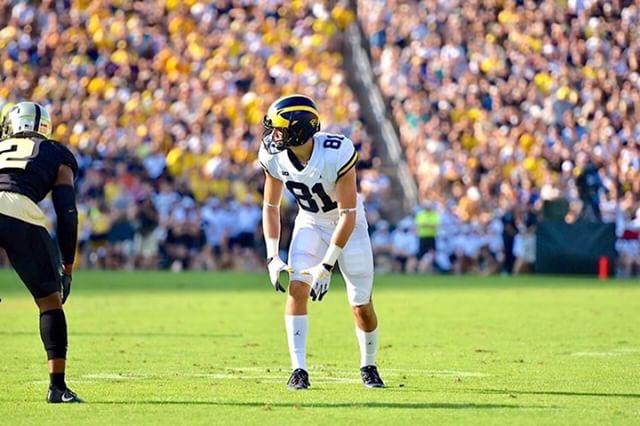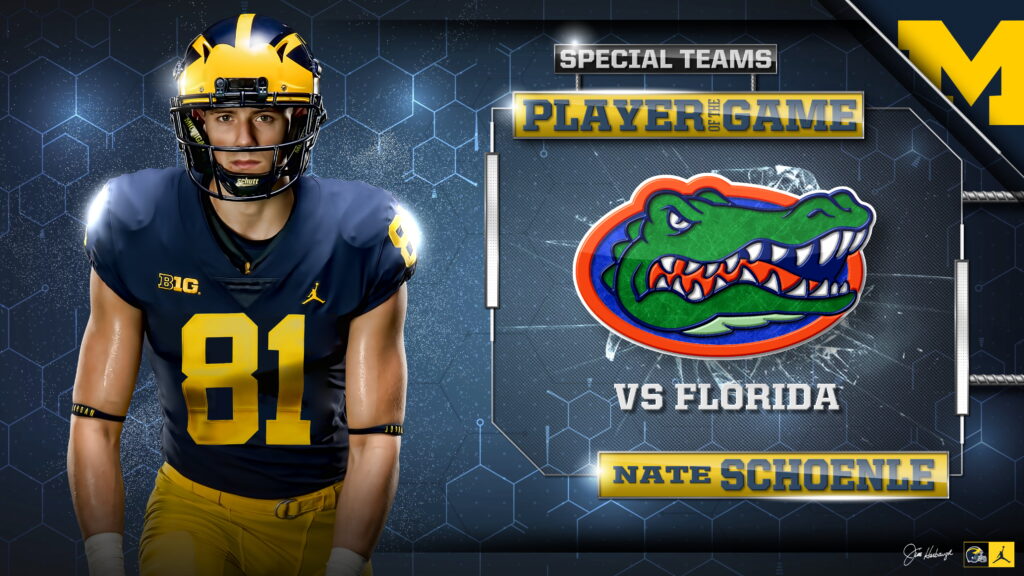Today we are excited to sit down with a father of a Big Ten football player, we discuss their recruiting process as well as lessons learned from being a Preferred Walk-On (PWO) student athlete.
When did the recruiting process start for Nate Schoenle?
Dad: For my son Nate, it wasn’t until after his junior football season that he really started thinking about playing college football. He grew a lot and had outstanding success his junior year and that created the interest of playing at the next level. He started going to camps and doing extremely well. He went to several MAC, FCS and U. of Michigan camps and ended up with a lot of interest based on his performance at these camps.

All these camps were during the summer, after which he decided to pursue college football and we started getting onto as many campuses in the fall quickly as we could. Since we started about a year late, he was there not only to visit the campus and generate interest, but to meet with coaching staffs and to receive and discuss offers.
University of Michigan was the top choice, what other programs were in the running?
Dad: Academics were really important to him along with football. Several D2 and FCS schools were super interested in him. One school basically said, “We see you as our starting receiver freshman year.” I mean, he was the best receiver on the team just from the camp, regardless of year. Obviously, he was a Michigan fan since he was three years old, and a new coaching staff was coming in, it was a big recruiting class and the academics, that’s what really attracted him to Michigan.
There were a couple Ivy League schools interested in him, and that’s what he was kind of debating back and forth. He would’ve been out East playing in a smaller program. So that’s when he really looked at Michigan as his number one choice. And to be perfectly honest with you, he didn’t ask us. It wasn’t a family decision.
Describe how the final decision was made.
Dad: When U of M brought the Preferred Walk-Ons in, of course, they gave them a tour of the stadium and everything, but he had been to many, many games. Being in the locker room and touring the Schembechler Hall was all cool. They took us out to the field; it was a cold day in late January and he just looked at me. I said, “What are you thinking?” He goes, “Well, I’m not saying anything yet, but it’s going to be a yes.” We went into the coach’s office afterwards and sat around a table, and I figured, okay, this is one of those, “Hey, I had a great day. I’m really excited about Michigan. Let me think it over and get back to you in a couple days.” Nate leaned back in his chair, didn’t even look at me or his Mom, just looked right at the coach and said, “Coach, I’m coming to Michigan.” And that was it. The coach called Harbaugh on the phone, handed Nate the phone and he and Harbaugh talked
How does the “Preferred Walk-On” process work from a scholarship perspective?
Dad: One of the things we learned early in the process was that while some divisions offer partial or half rides, in D1 BCS, there are no half rides. They have their allotment of full ride scholarships and either you’re on scholarship or you’re not.
Non-scholarship players (PWO’s and regular walk-ons) get the team meals, medical support, rehab services and special training. If you’re playing well, you can make the travel team and get go to a bowl game. You get all of that, you just don’t get any money for tuition, books, fees or extra food.
He earned a full scholarship junior year, after being a PWO his freshman year and sophomore year. If you were brought in on scholarship, as long as you are in good standing with the team and in your academics, you keep your scholarship. Even if you’re not playing or you’re injured you’ll keep your scholarship. But the walk-ons have to re-earn it every year.
What did you/Nate wish you knew before playing the college game?
Dad: It was harder than he ever thought in his freshman year in that summer camp, but he just kept working. And by the end of his freshman year, he had a great spring camp, moved up the depth chart, caught some passes in the spring game, and was looking at being in the 1’s and 2’s. At wide receiver they rotate people in and out, so both the 1’s and 2’s play a lot. He was a 2 his sophomore year, so he proved quickly that he had what it took to be competitive, but he worked super hard. I think he probably worked a lot harder than most… He was in that top echelon of hard workers on the team and got special recognition from the coaching staff based on his work ethic.

I think a lot of players at that point either aren’t academically strong enough or aren’t focused enough to do everything that it takes to be successful on the team and in the classroom. He was focused on football and academics. And he was really successful because of his focus.
He never really got hurt until college and the significance of his injuries were, particularly the last one, really serious. His injuries have all healed and he’s a hundred percent. So even though it was frightening for us and really difficult for him, he came through it and he’s a stronger man for having experienced and taken on those setbacks.
How did his playing experience prepare him for the next phase of life?
Certainly, from an athletic perspective, a lot of young men in his position just don’t know what it’s like to compete at D2, certainly D1 level, coming out of high school. The speed of the game is incredibly fast and it’s a big change for most athletes, then you throw the academic demands on them, and it becomes very difficult.
Dad: So now to your question about business. I think it probably exceeded his expectations in terms of the preparation he received. Now, of course, you learn how to be a master at time management. You learn how to be totally focused on a football program and in the classroom. Those are just things you have to learn. You can have the talent and natural ability, but until you prove it and do it day in, day out, year in, year out, that’s really what sets them apart I think when they’re being interviewed for jobs. You have to have the grades, but if you have the grades and you have a great reputation as being a leader and a trustworthy teammate, that’s a combination for success in interviews and a post-football career.
The networking opportunities were excellent; it’s amazing how many doctors and attorneys and executives are former Michigan football players, and those alumni reach out to these players. They have events where you basically pick your track. For example, the athlete can say they want to talk to attorneys, or to financial and business executives. It’s great networking, learning about their careers, learning about companies that value men developed through Michigan football. There was also formal career counseling and mock interviews. All of this really made an impression on him.
When did the career planning start?
Dad: Actually, it was pretty early. I think he went to an event freshman and sophomore years. He also had discussions with upperclassmen about career choices. The Ross Business School opened a number of opportunities for him whether it’s investment banking or consulting or straight business. To understand possible career fits he had an opportunity to talk with some teammates and that’s really how he became interested in consulting. His old man can tell him something, but when he hears it from a teammate, that carries even more weight.
How important was your research during the recruiting process or choosing the right school?
Dad: We’re info junkies, and Nate was our fourth to go through school and every single one of the kids had a different track. So, for each child we did a lot of research upfront to learn what we needed to know and what they needed to know to make good decisions. As a parent, if you have the capability, the time and the interest to dig out all that information, you can find it, but it’s a lot of work. We never have considered another resource to help us along. But we know a lot of people that are not really in a position to find out all that they need. I would never discourage anyone from using a service; a lot of people do.
